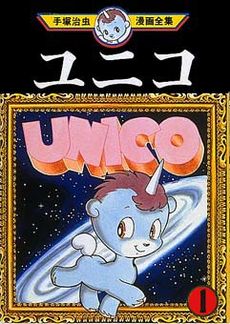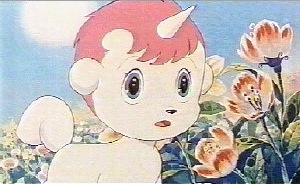Unico facts for kids
| Unico | |

The cover for Unico volume 1 from the Osamu Tezuka Manga Complete Works edition.
|
|
Quick facts for kids ユニコ(Yuniko) |
|
|---|---|
| Genre | Comedy, fantasy |
| Manga | |
| Written by | Osamu Tezuka |
| Published by | Sanrio |
| Demographic | Shōjo |
| Magazine | Ririka |
| Original run | November 1976 – March 1979 |
| Volumes | 2 |
| Anime film | |
| Unico: Black Cloud and White Feather | |
| Directed by | Toshio Hirata |
| Produced by | Shintaro Tsuji Valentín Pimstein |
| Written by | Masaki Tsuji |
| Studio | Tezuka Productions |
| Licensed by | Televisa |
| Released | April 5, 1979 (Japan) February 18, 1980 (Mexico) |
| Runtime | 25 minutes |
| Anime film | |
| The Fantastic Adventures of Unico | |
| Directed by | Toshio Hirata Osamu Tezuka |
| Produced by | Masao Maruyama Tsunemasa Hatano Valentín Pimstein |
| Written by | Masaki Tsuji |
| Music by | Masahiko Sato |
| Studio | Madhouse |
| Licensed by | Televisa |
| Released | March 14, 1981 (Japan) September 27, 1982 (Mexico) May 12, 1983 (USA) |
| Runtime | 90 minutes |
| Anime film | |
| Unico in the Island of Magic | |
| Directed by | Moribi Murano |
| Produced by | Masao Maruyama Tsunemasa Hatano Ernesto Alonso |
| Written by | Masaki Tsuji |
| Music by | Nozomi Aoki |
| Studio | Madhouse |
| Licensed by | Televisa |
| Released | July 16, 1983 (Japan) November 10, 1983 (USA) January 30, 1988 (Mexico) |
| Runtime | 90 minutes |
Unico (ユニコ, Yuniko) is a cute baby unicorn character created by Osamu Tezuka. Unico has soft white fur, a pink mane, and small, round ears. He was born with a very special power: he can make everyone around him feel happy and lighthearted!
Unico makes friends with many different characters in his stories. These include Beezle, a young devil from Scottish myths, and Chao (also called "Katy" in the English cartoon), a sweet little cat who wishes to become a human girl. He also meets a brave Sphinx and a kind Polish girl named Cheri.
Contents
Unico's Story
Unico's adventures first appeared in a Japanese magazine called "Ririka" from 1976 to 1979. The story is about a young unicorn who brings joy to everyone he meets. This magical idea quickly became popular and is now a classic cartoon.
The story begins in ancient Greece. Unico's first friend was a young girl named Psyche. She was so happy because of Unico that the goddess Venus became jealous. Venus believed only gods should control emotions. She decided to get rid of Unico.
Venus asked the West Wind to take Unico far away to the Hill of Oblivion. There, Unico would forget all his friends and past adventures. But the West Wind felt sorry for Unico and didn't want to follow Venus's harsh command.
The gods were angry when they found out the West Wind didn't obey. So, they sent the Night Wind to catch Unico instead. To protect Unico, the West Wind has to keep moving him to new places. Every time Unico makes new friends and brings happiness, the gods find out where he is. The West Wind then has to whisk him away, and Unico loses his memories again. This means new adventures always begin for Unico!
Unico in Media
Manga Comics
Unico first appeared in comic strips drawn by Tezuka. These comics often had a message about protecting nature. The original manga was published in "Ririka" magazine from 1976 to 1979. It was later re-released for children in 1984.
Animated Films
Unico: Black Cloud, White Feather
In 1979, Unico appeared in his first animated film. It was called Kuroi Kumo Shiroi Hane, which means Black Cloud, White Feather. This short film was about protecting the environment. In the story, Unico meets a sick girl named Chiko. She is ill because of pollution from a nearby factory. Unico tries to destroy the factory to save Chiko.
The Fantastic Adventures of Unico
Unico starred in two full-length animated movies. The first one, called The Fantastic Adventures of Unico, came out in 1981. This musical film tells Unico's backstory. It shows how the gods banished him and his travels. It also shows his friendships with Beezle and Chao/Katy.
Beezle is a Scottish Devil. At first, he doesn't want to be friends with Unico. But he soon realizes how lonely he is. After Beezle saves Unico, they become good friends. But then, the West Wind arrives to take Unico away again.
Next, Unico meets Chao, a black-and-white cat who lives in Louisiana. Chao dreams of becoming a human girl and learning magic. Unico helps Chao become a girl. But Chao becomes selfish. Unico refuses to change her back until she learns to be kind. Later, Chao is tricked by a bad man. Unico, with help from Beezle, rescues her. Unico even turns into a majestic winged unicorn to fight a monster! After this adventure, the West Wind takes Unico away once more.
Unico in the Island of Magic
The second movie, Unico in the Island of Magic, was released in 1983. This film continues Unico's journey. The West Wind drops Unico off in a new place, Poland, and erases his memory again.
Unico meets a kind Polish girl named Cheri. Cheri's older brother, Toby, works for an evil being named Lord Kuruku. Kuruku wants to turn all living creatures into "Living Puppets" to be his slaves. Toby's job is to help Kuruku, hoping to learn his magic. Cheri and Unico team up to stop Kuruku.
They learn that Kuruku is actually a puppet who was thrown away and came to life with a lot of sunlight. He wants revenge on humans. With help from the Sphinx's daughter, Unico realizes Kuruku is just lonely. Unico breaks Kuruku's spell. Kuruku then turns back into a puppet, and Cheri keeps him as a toy. Soon after, the West Wind finds Unico and takes him away again to keep him safe from the gods.
Saving Our Fragile Earth
Unico also appeared in a short film called Saving Our Fragile Earth. This film was shown at the Tezuka Osamu Animation Theatre in Japan. It also had a message about the environment. In this story, Unico and a talking tree boy named Tsubasa are sad because Earth is very polluted. With help from the Sphinx and the "Time Fairy" (Astro Boy), they travel back in time. They try to stop humans from harming the Earth so much.
Other Appearances
Unico has made small appearances in other cartoons and games.
- He can be seen in some episodes of the Black Jack TV series.
- Unico appears in the Game Boy Advance game Astro Boy: Omega Factor. In the game, he helps Astro Boy have a special talk with his father.
- He also shows up briefly in the game Columns GB: Osamu Tezuka Characters for the Game Boy Color.
- Since the Unico films were made by Sanrio, some other famous Sanrio characters like Hello Kitty and the Little Twin Stars make small appearances in the movies.
Images for kids
See also
 In Spanish: Unico para niños
In Spanish: Unico para niños
 | James Van Der Zee |
 | Alma Thomas |
 | Ellis Wilson |
 | Margaret Taylor-Burroughs |



